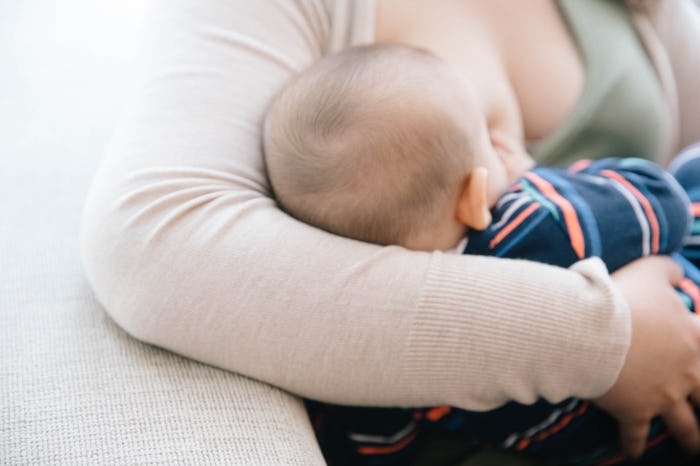Life
If Postpartum Sex Hurts, Breastfeeding Could Be To Blame
It's not uncommon for women to complain about breast pain when they are first getting into the swing of breastfeeding a new little one. Some of the most common culprits behind pain while breastfeeding are poor latch and cracked nipples, while more complicated issues involve mastitis, thrush, and/or inverted nipples. But what about pain down there while you are nursing? After all, the last time you got hot and heavy with your significant other, your reaction was more "Ouch!" than ohmygodyes. But does sex hurt when you're breastfeeding? Or, better yet, should it?
"It is common for women to experience dyspareunia (painful sex) postpartum and/or while breastfeeding," Dr. Rachel Gelman, physical therapist and branch director at Pelvic Health and Rehabilitation Center, tells Romper in an email interview. "This may be due to many reasons, one of which can be the fact that a woman’s estrogen levels decline during delivery and they will continue to be low during the postpartum period, especially if a woman is breastfeeding, as the hormone that allows for lactation is antagonistic to estrogen production."
Gelman explains that vulvar and vaginal tissue is mediated by estrogen and this hormone keeps the tissue thick, elastic, and lubricated. "So, less estrogen can mean thinner, drier, and impaired vaginal tissue," she says. "This can lead to pain with penetrative intercourse."
Jamie Yates, a certified lactation counselor, doula, and childbirth educator, agrees with Gelman, adding that "pregnancy, childbirth and breastfeeding all involve significant hormone changes. Not surprisingly there are several changes that happen in the vagina," she tells Romper in an email interview. "[But pain] doesn’t happen to every breastfeeding mother and usually gets better after breastfeeding is finished."
Also at risk for the ouch factor? Your breasts, says Leigh Anne O’Connor, an International Board Certified Lactation Consultant (IBCLC) and parenting coach, in an email interview with Romper. "If breasts are tender they can be painful during sexual activity," O'Connor says. "Communication, patience, and a sense of humor can help." Of course, she adds: "If breasts are tender they can temporarily be a no touch zone."
But Gelman assures women that there are many options to mediate this pain, specifically the kind that affects your ability to have sex with your partner. One solution? Good ol' fashioned lubricant. Even if you don't have breastfeeding-related pelvic pain, you might want to consider lube. Experts say it can not only make things more comfortable, but it can even lead to better orgasm.
Of course if you have persistent pain that can't be solved with an over-the-counter remedy like personal lubricant, you may also want to speak with your healthcare provider about what could be going on down there. Conditions like a vaginal infection, pelvic inflammatory disease, or endometriosis could be to blame.
Another thing to consider is changes in ligaments and tissues that have occurred as a result of pregnancy and/or delivery. In my case, I knew something was wrong when I set out for my first run at six weeks postpartum. After spending more than 20 years as an avid runner and hitting the pavement until I was 35 weeks pregnant, the pain that shot through my pelvis with that first step was a huge red flag for me. It took landing on a women's health physical therapist to learn that I had a high-tone pelvis, the result of too many years spent strengthening without the counterbalance of relaxation. Labor and delivery turned out to be the proverbial straw that broke the camel's back or, in this case, what felt like my entire vagina.
Moral of the story? Yes, a lot of these symptoms that creep up after pregnancy and delivery are normal. But when the problem hangs around or you just get the sense that something is off, it's time to see your healthcare provider.
Check out Romper's new video series, Romper's Doula Diaries:
Watch full episodes of Romper's Doula Diaries on Facebook Watch.
